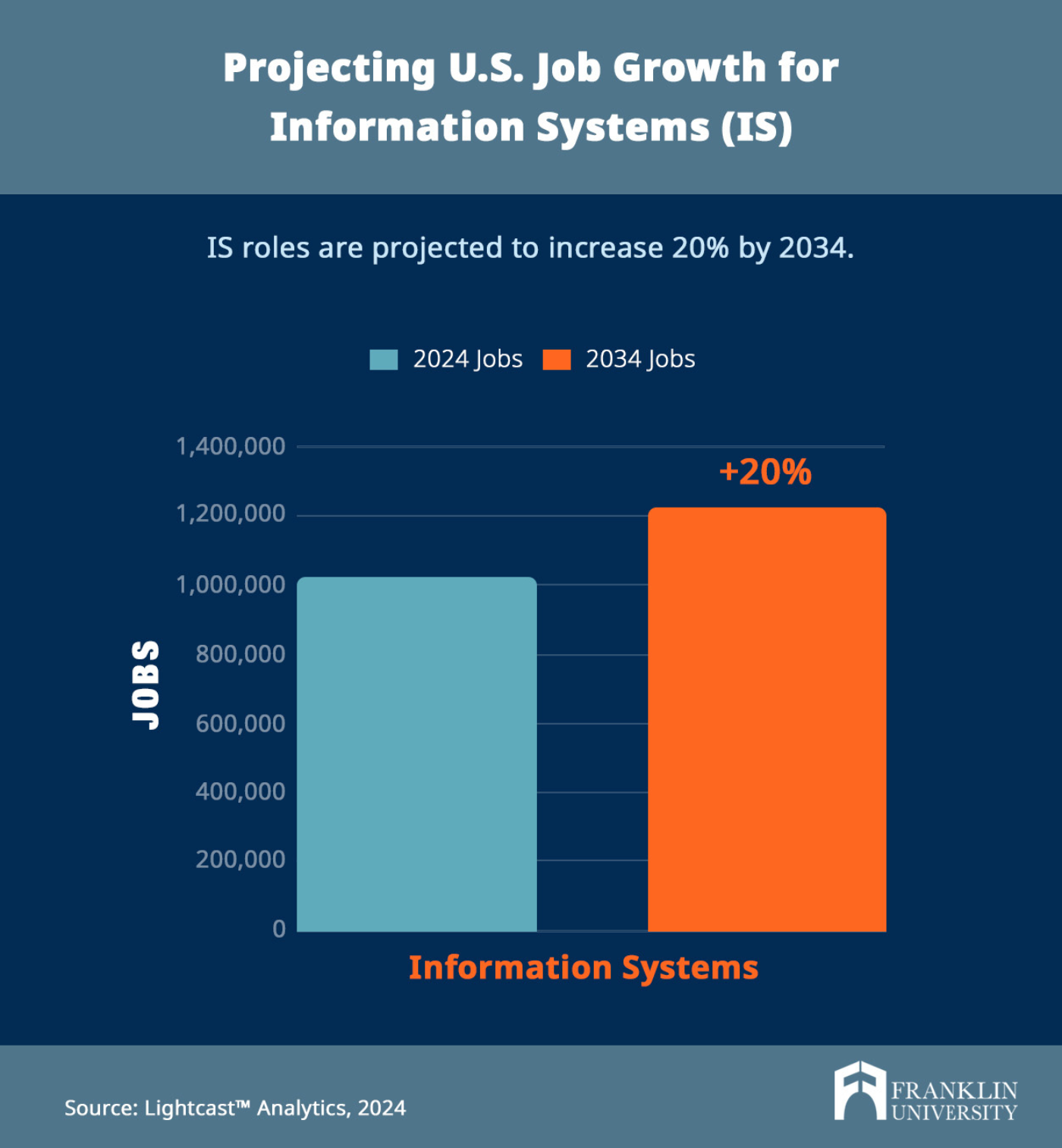Request Information
We're Sorry
There was an unexpected error with the form (your web browser was unable to retrieve some required data from our servers). This kind of error may occur if you have temporarily lost your internet connection. If you're able to verify that your internet connection is stable and the error persists, the Franklin University Help Desk is available to assist you at helpdesk@franklin.edu, 614.947.6682 (local), or 1.866.435.7006 (toll free).
Just a moment while we process your submission.

Is a Master’s in Information Systems Worth It?
A master's program in information systems can be your gateway into the world of business and information technology roles. Nowadays, business professionals and consumers rely more on search engines, databases and financial systems; hence, companies need individuals with the skills to manage these functions in their businesses.
But what makes a master's degree in information systems (MIS) stand out among the many information technology degrees available? Is this graduate degree the key to unlocking better career opportunities and earnings potential? Find out below as we look at the growth, benefits, skills and career paths of this dynamic master's program.
The Growing Demand for Information Systems Professionals
According to Lightcast™ Analytics, in January 2024, there were 18,596 new IS-related job postings and 39,032 people hired, meaning roughly two professionals were hired for every unique posting. Included in these job postings were the roles of computer and information research scientists, database administrators, computer and information systems managers, web and digital interface designers and software quality assurance analysts.
Data from Lightcast™ also suggests that the number of above mentioned roles will increase by 20% from 2024 to 2034, which is far greater than the projected overall job growth of 2.8% across all occupations in the United States from 2022 to 2032. This disparity shows the growing opportunity in the information systems industry and the importance of IS professionals as businesses increasingly depend on technology.

Why You Should Consider a Master's Degree in Information Systems
A master's in information systems perfectly balances business and technology, combining a master's in computer science, which focuses on software development and a master's in IT management, which teaches you how to manage tech resources. With a master’s degree in information systems, you will develop skills in project management, data analytics and business analysis.
"Earning an MIS degree allows you to be the bridge person between awkward IT and excited business personnel," says Todd A. Whittaker, Ph.D., chair of Franklin University's Information Systems master's program. "It prepares you to smooth the waters with solutions that meet business while staying grounded in IT reality."
But you're probably wondering, if I already have a bachelor's degree in information systems, why should I get a master's degree?
"The IS field has changed over the past 10 years," Whittaker says, "and having the skills to leverage new information technology will set you apart. Earning an MIS degree can help you open the door to new roles, earn a higher salary and expand your professional network."
With the promise of new opportunities, an MIS degree can significantly increase an IS professional’s wage. According to January 2024 data from Lightcast™, the median salaries for the five roles mentioned earlier in the article differ substantially by education level. Positions requiring a bachelor's degree pay $122,200 annually, while roles requiring a master's degree pay $156,400 annually. This difference represents a median salary increase of $34,200 per year, an approximate 28% growth in annual earnings.
Although an IS professional could benefit from a salary increase if they further their education, Whittaker says there are other reasons to consider a master's degree.
“The degree really shines if you already have a business degree and want to transition into a technology-adjacent role, or if you have a tech degree such as computer science or IT and you want to transition into a leadership or business role," Whittaker says.
What matters most when choosing a master’s program? Compare features, benefits and cost to find the right school for you.
What You Will Learn in a Master's Degree in Information Systems Program
An MIS student will learn how to blend information technology and business to drive innovation and lead cross-functional teams within an organization. Below are the six skills you'll learn throughout the degree.
Skill #1: Data Analysis
Data analysis involves collecting, processing and analyzing the data needed to make business decisions. During your master's degree in IS, you will learn to use statistics, computer science and information theory to analyze information and meet the growing complexities of big data.
Skill #2: Business Analytics
Business analytics is the process of transforming data into insights to make informed business decisions. MIS students will learn technical skills such as identifying new patterns with data mining, using quantitative and statistical analysis to design business models, and predictive modeling to forecast business needs, performance and trends.
Skill #3: Database Management
Database management is the activity of collecting, organizing and accessing data, supporting a business's productivity and decision making. MIS students will learn data management from an applied perspective and through practical learning that will teach them how to use structure query language (SQL) for data analytics, relational database design and data warehousing.
Skill #4: Project Management
Project management involves overseeing resources, timelines and project scopes to lead a team to meet its intended goal on time and within budget. Throughout your master's degree, you will learn how to coordinate teams and manage stakeholder expectations.
Skill #5: Policy Development
Policy development in the context of the IT industry aims to teach you how to develop, implement and evaluate policies that allow the use of information technology within an organization. MIS students will learn to understand compliance requirements, manage risks with IT assets and ensure that IT objectives align with the organization's goals.
Skill #6: Leadership
Leadership involves guiding a team with effective communication and collaboration to drive innovation and organizational change. As an MIS student, you will develop your leadership skills, qualifying you for management roles like chief technology officer. You will learn how to plan and guide teams through challenging projects involving strategic thinking and technology.
With the skills above, a master's degree in IS will equip you with the expertise to help organizations operate more effectively. To illustrate this point, we can look at Lightcast™, which shows the 2-year change in national demand for data analysis skills is projected to grow by 26%, project management skills by 20% and leadership skills by 8%.
Learning additional skills such as Python (programming language) and agile methodology can boost your salary, with the demand for these skills projected to grow by 24% and 20%, respectively. This growth indicates employers seek professionals who can make data-driven decisions and lead tech and business initiatives with innovative ideas.

Five Leading Career Paths for Information Systems Professionals
With information technology and business skills, MIS graduates are qualified to pursue many career paths. The jobs below are five compelling opportunities available to IS professionals.

Computer and Information Research Scientist
Computer and information research scientists develop revolutionary uses for new and existing technology, mainly in business, science and medicine. They create and improve computer software and hardware by working with algorithms, a set of instructions for computers. An MIS degree provides the knowledge needed in algorithm design, data science and information theory.
- Median Pay: $136,620 (U.S. Bureau of Labor Statistics)
Database Administrator
Database administrators create and organize systems to store information, such as financial data and customer shipping records. They are also responsible for making data available to authorized users. An MIS degree teaches you database management, how to store and retrieve data and the network information security skills needed for this role.
- Median Pay: $112,120 (U.S. Bureau of Labor Statistics)
Information Systems Manager
Information systems managers, also called information technology (IT) managers or IT project managers, are responsible for planning, coordinating and directing computer-related activities in a firm. They assist in determining the information technology goals of a company and executing the computer systems needed to meet those goals. An MIS degree helps you build your leadership and technical skills to manage teams, projects and information systems.
- Median Pay: $164,070 (U.S. Bureau of Labor Statistics)
Software Quality Assurance Analyst
Software quality assurance analysts are responsible for creating computer programs and the systems that run devices and control networks that enable users to perform specific tasks. They also perform tests to detect problems and aim to understand how the software works. An MIS degree helps you understand software development lifecycles, different types of testing and quality control.
- Median Pay: $124,200 (U.S. Bureau of Labor Statistics)
Web and Digital Interface Designer
Web and digital interface designers create and maintain websites and are responsible for the various technical aspects and functionalities of websites, such as performance and capacity. They may also create content and develop, create and test a website's interface, functions and navigation for usability. An MIS degree teaches you about user experience (UX) design, web development and digital media.
- Median Pay: $80,730 (U.S. Bureau of Labor Statistics)
Through theoretical and practical learning, MIS students at Franklin University benefit from a curriculum designed by industry experts and learn how to solve strategic problems through capstone projects. If you are interested in this field, Franklin can prepare you for the many job opportunities that will allow you to shape the future of business through technology.
Choose the Right Master's in Information Systems for You
According to the data, professionals with information technology and business skills are in high demand, making this degree an excellent investment for those looking to advance in the IS field. If you’re unsure whether you're qualified for a master's degree, check out what you need to know before applying for a master's degree.
Franklin University specializes in flexible, online education for working adults. Franklin’s master's in information systems degree is designed to teach you to apply project management and data analysis concepts to real-world scenarios, allowing you to excel in today's agile business environment.
As an AWS Academy member institution, Franklin’s students learn the leadership and innovation skills needed to qualify for various hybrid roles in large corporations and startups. Explore Franklin’s programs to learn more about the University’s industry-relevant courses, experienced faculty and supportive online learning environment.





